Related Research Articles

Nelson is a consolidated city and unitary authority on the eastern shores of Tasman Bay at the top of the South Island of New Zealand. It is the oldest city in the South Island and the second-oldest settled city in the country; it was established in 1841 and became a city by British royal charter in 1858. It is the only consolidated city-region in the nation.
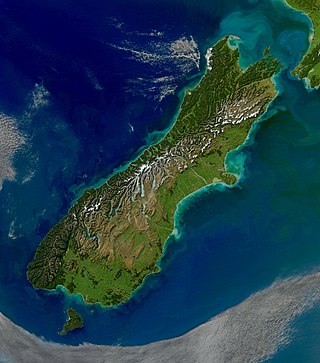
The South Island is the largest of the three major islands of New Zealand in surface area, the other being the smaller but more populous North Island and sparsely populated Stewart Island. It is bordered to the north by Cook Strait, to the west by the Tasman Sea, to the south by the Foveaux Strait and Southern Ocean, and to the east by the Pacific Ocean. The South Island covers 150,437 square kilometres (58,084 sq mi), making it the world's 12th-largest island, constituting 56% of New Zealand's land area. At low altitudes, it has an oceanic climate. The major centres are Christchurch, with a metropolitan population of 521,881, and the smaller Dunedin. The economy relies on agriculture, fishing, tourism, and general manufacturing and services.

Banks Peninsula is a peninsula of volcanic origin on the east coast of the South Island of New Zealand. It has an area of approximately 1,200 square kilometres (450 sq mi) and encompasses two large harbours and many smaller bays and coves. The South Island's largest city, Christchurch, is immediately north of the peninsula.
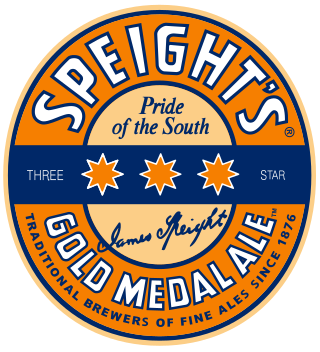
Speight's is a beer brand and a brewery located in Dunedin, New Zealand. The brand is owned by the Japanese-controlled holding company Lion, itself a subsidiary of Kirin. Speight's is best known for its Gold Medal Ale, one of the best-selling beers in New Zealand. The brewery also includes a chain of "Speight's Ale House" gastropubs across the country.

The Port Hills are a range of hills in Canterbury Region of New Zealand, so named because they lie between the city of Christchurch and its port at Lyttelton. They are an eroded remnant of the Lyttelton volcano, which erupted millions of years ago.

Christchurch is the largest city in the South Island and the second-largest city by urban area population in New Zealand. Christchurch has an urban population of 415,100, and a metropolitan population of over half a million. It is located in the Canterbury Region, near the centre of the east coast of the South Island, east of the Canterbury Plains. It is located near the southern end of Pegasus Bay, and is bounded to the east by the Pacific Ocean and to the south by the ancient volcanic complex of the Banks Peninsula. The Avon River (Ōtākoro) winds through the centre of the city, with a large urban park along its banks. With the exception of the Port Hills, it is a relatively flat city, on an average around 20 m (66 ft) above sea level. Christchurch has a reputation for being an English city, with its architectural identity and nickname the 'Garden City' due to similarities with garden cities in England, but also has a historic Māori heritage. Christchurch has a temperate oceanic climate with regular moderate rainfall.

Lyttelton is a port town on the north shore of Lyttelton Harbour / Whakaraupō, at the northwestern end of Banks Peninsula and close to Christchurch, on the eastern coast of the South Island of New Zealand.

Cashmere is a suburb which rises above the southern end of the city of Christchurch in New Zealand's South Island, on the north side of the Port Hills. It covers an area of 4.71 km2 (1.82 sq mi) and has a population of 6,453 as at 2018.

Beer is the most popular alcoholic drink in New Zealand, accounting for 63% of available alcohol for sale. At around 64.7 litres per person per annum, New Zealand is ranked 27th in global beer consumption per capita. The vast majority of beer produced in New Zealand is a type of lager, either pale or amber in colour, and typically 4–5% alcohol by volume.
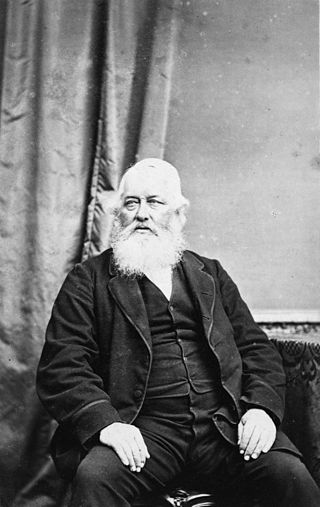
Sir John Cracroft Wilson, also known as Nabob Wilson, was a British-educated civil servant in India, farmer and politician in New Zealand.

Lyttelton Harbour / Whakaraupō is a major inlet on the northwest side of Banks Peninsula, on the coast of Canterbury, New Zealand; the other major inlet is Akaroa Harbour, which enters from the southern side of the peninsula. Whakaraupō enters from the northern coast of the peninsula, heading in a predominantly westerly direction for approximately 15 km (9.3 mi) from its mouth to the aptly-named Head of the Bay near Teddington. The harbour sits in an eroded caldera of the ancient Banks Peninsula Volcano, the steep sides of which form the Port Hills on its northern shore.
McCashin's Brewery, also known as Mac's Brewery in the past, is a small brewery based in Nelson, New Zealand. It was founded in 1980/81 by one of the pioneers of craft brewing, Terry McCashin, who produced the well-known Mac's beer. Today it produces Rochdale Cider and a range of Stoke beers.

Craigieburn Forest Park is a protected area in the South Island of New Zealand, adjacent to Arthur's Pass National Park to the north.

Ohinetahi is a valley, historic homestead, and formal garden on Teddington Road, Governors Bay, Christchurch, Canterbury region, New Zealand. Ohinetahi valley is situated at the head of Lyttelton Harbour, at the base of the Port Hills. While the Ohinetahi Homestead is considered to be a significant historic building in the small settlement of Governors Bay, the formal garden of Ohinetahi is considered to be one of New Zealand's finest. Amongst the early owners of Ohinetahi were Canterbury pioneer William Sefton Moorhouse and Thomas Potts, New Zealand's first conservationist. Sir Miles Warren, architect of the Christchurch Town Hall, was the last private owner, and gifted it to New Zealand.
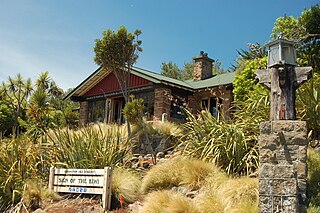
The Sign of the Kiwi, originally called Toll House, is a small café and shop at Dyers Pass on the road between Christchurch and Governors Bay. It was built in 1916–17 by Harry Ell as a staging post and opened as a tearoom and rest house. It has a Category I heritage classification by Heritage New Zealand and is a popular destination for tourists and locals alike. The building was closed some time after the 22 February 2011 Christchurch earthquake and did not open again until 23 January 2017, six years later. Although located within the burned area, the building was not damaged by the 2017 Port Hills fires a month later.

Ōrongomai / Cass Peak is a hill in the western Port Hills in Christchurch, New Zealand. Its most notable feature is a radar dome that was built on the peak in the late 1980s, which is used for aircraft positioning services.

Lion is an alcoholic beverage company that operates in Australia and New Zealand, and a subsidiary of Japanese beverage conglomerate Kirin. It produces and markets a range of beer and cider in Australia, and wine in New Zealand and the United States through Distinguished Vineyards & Wine Partners. It acts as distributors for a range of spirits in New Zealand, but does not own any distilleries outright, although holding a 50% share of Four Pillars Gin in Victoria.

Christchurch Adventure Park is an adventure park in the Port Hills of Christchurch, New Zealand. Built by the Canadian company Select Evolution, it had its opening function on 16 December 2016. The 1500 holders of special passes could ride from 17 December, while the park opened to the public on 21 December. According to the developer, the 358 hectares park with a 1.8 kilometres (1.1 mi) chairlift and initially 50 kilometres (31 mi) of downhill tracks is the largest facility of its kind in the Southern Hemisphere. The park closed on 13 February 2017 as a precaution due to a nearby fire and two days later, most of the park's tree cover had been destroyed in a large wildfire. The lift and ziplines have suffered significant damage, and the park's condition was much worse than the operator initially thought. The park reopened on 6 December 2017, ten months after it shut.
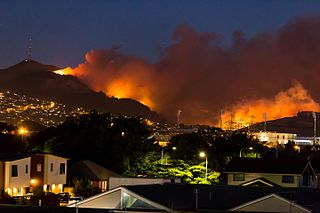
The 2017 Port Hills fires were wildfires in the Port Hills of Christchurch, New Zealand. Two separate fires, several kilometres apart, started on Monday afternoon on 13 February 2017. By Wednesday night, the fires had combined to one large area. A helicopter crashed helping to fight the fires, causing the death of the pilot. Nine houses were destroyed and a further two were significantly damaged by the fires, and hundreds of residents were evacuated. The cause is officially undetermined, but it is believed the fires were deliberately lit.

Kennedy's Bush Scenic Reserve is a public conservation reserve in the Port Hills south of Christchurch, New Zealand. It sits above the suburb of Kennedys Bush on the northern side of the hills, just north of Ōrongomai / Cass Peak. The reserve is covered in dense native bush, and at 130 hectares it is the largest remaining patch of native bush on the Port Hills.
References
- 1 2 "Nelson craft beer pioneer Terry McCashin dies". Stuff . 1 November 2017. Retrieved 1 November 2017.
- ↑ "Mac's founder Terry McCashin has died". The New Zealand Herald . 1 November 2017. Retrieved 1 November 2017.
- ↑ Fletcher, Jack (5 October 2018). "'Exciting' day for Christchurch as 233 hectares of Port Hills land purchased for public access". Stuff . Retrieved 4 May 2019.